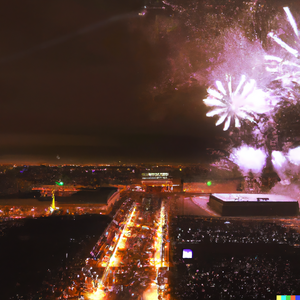Soviet Union Centennial (TheodoresTomfooleries)
| Centennial of the Founding of the Union of Soviet Socialist Republics Столетие образования Союза Советских Социалистических Республик | |
|---|---|
| File:Wip | |
 Celebrations in Leningrad on 10 December | |
| Date(s) | December 10, 2022 - April 22, 2023 |
| Country | |
| Activity | 100th anniversary of the founding of the Union of Soviet Socialist Republics |
The Centennial of the Founding of the Union of Soviet Socialist Republics was a series of national celebrations and festivals in the Soviet Union to mark the 100th anniversary of the signing of the Treaty on the Creation of the Soviet Union on 29 December, 1922 (effective 30 December). The planned festivities were announced on 7 November and celebrations began on the 10th of December. Festivals were held in varying locations from 10 December, 2022 to 22 April, 2022 in two stages: the first from 10 December to 29 December counting the days until the Treaty of Creation was effective, and the second stage focusing on smaller festivals celebrating the birth of Vladimir Lenin, regarded as the founder of the Soviet Union. Many of the flags of the Union Republics were subject to redesigns in preparation for the event, and it was ordered that a major celebration and parade take place in the capitals of every Union Republic.
30 December was marked as a non-working holiday for the centennial, and the centennial's festivities also overlapped with the celebration of New Years' Eve and Day.
Background
The entry of the Russian Empire into World War I, along with its failures on the eastern front resulted in the events of the Russian Revolution. The first stage took place in March (at the time February as Russia still used the Julian calendar) and established a democratic (albeit very unstable) republic which continued the unpopular war. The second stage took place in November (O.S. October) and was led by the Bolsheviks, who declared a socialist republic in Petrograd. The revolution was not universally recognised as legitimate, and as a result the Russian Civil War broke out between the Bolsheviks- who supported the revolutionary socialist government, and the whites- who were a disorganized "big tent" group all opposed to the Bolsheviks. The Bolsheviks established soviet republics across most of the former Russian Empire. On 29 December, 1922 a treaty uniting the Russian SFSR, the Ukrainian Socialist Soviet Republic, the Byelorussian Socialist Soviet Republic and the Transcaucasian SFSR was signed in Moscow. The treaty itself was made effective the following day and established a socialist federation known as the Union of Soviet Socialist Republics.
The founding of the Soviet Union has largely never celebrated in any significant capacity. Medallions and celebrations were held for the Soviet Union's 50th anniversary in 1972, but these celebrations for the most part were minor compared to its equivalents in the rest of the world. The 75th anniversary in 1997 was celebrated with more fervor, but it failed to surpass the celebrations held on holidays like October Revolution Day and Victory Day. However, with the centenary of the Soviet Union's founding approaching, the government of the Soviet Union- particularly General Secretary Sabrican Garayev showed great interest in "giving our centennial a feeling that would rival any recent 4th of July celebrations". During October Revolution Day, the Soviet government announced its intentions to "begin across the nation grand and spectacular celebrations in all of the Union Republics starting on 10 December".
Events
Parades were held in the capital cities of the union republics from 11 December to 25 December, with each event starting based on the order of which their union republics were listed in the constitution. Preceding this was a series of parades and festivities in Leningrad, which was selected by Soviet authorities to be the first site of festivities owing to its role in the October revolution. Later festivities were held from 25 December to 29 December in so-called Hero Cities.